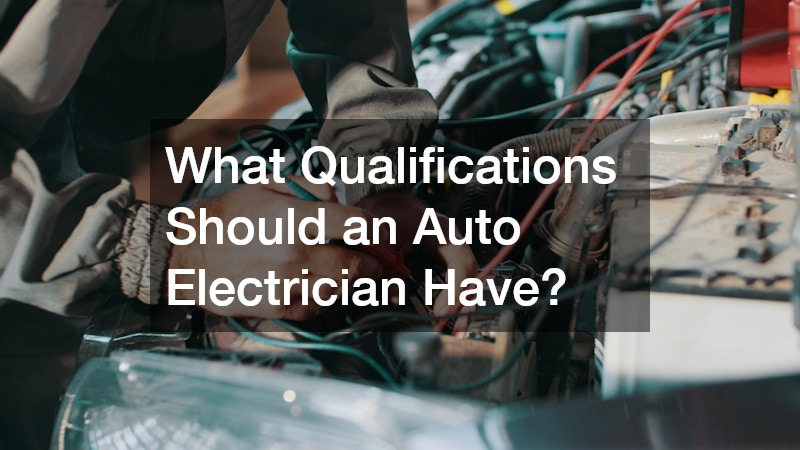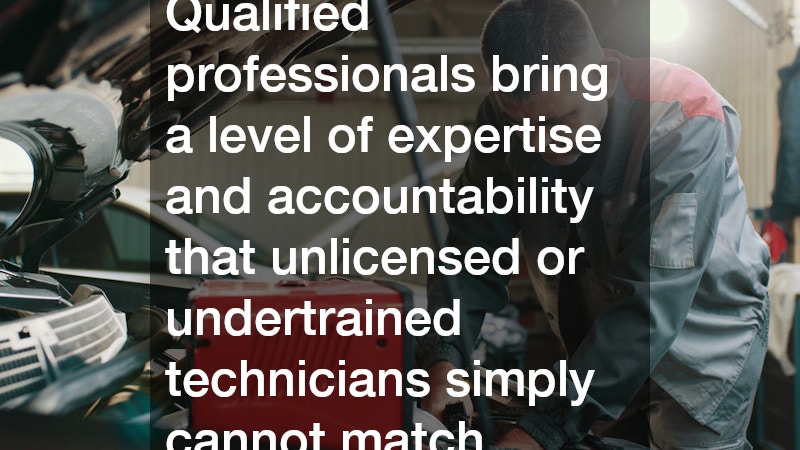
When your vehicle experiences electrical issues, whether it’s a malfunctioning alternator, flat battery or a complex computer diagnostic fault, it’s vital to rely on a qualified professional. An auto electrician specialises in identifying, diagnosing and repairing electrical faults in vehicles. However, not all technicians are created equal.
To ensure your vehicle is in capable hands, understanding the qualifications and expertise required for this profession is essential.
The Importance of Formal Training
In Australia, becoming an auto electrician begins with a formal apprenticeship. This typically involves completing a Certificate III in Automotive Electrical Technology, a nationally recognised qualification that equips future professionals with the practical skills and theoretical knowledge necessary for the job. This certificate generally takes around four years to complete and is structured around a combination of on-the-job training and classroom-based learning.
Throughout this course, students develop a comprehensive understanding of automotive electrical systems, including charging systems, lighting, starting systems, electronic fuel injection and computer-based diagnostics. The rigorous training ensures graduates can work confidently with a wide range of vehicles, from passenger cars to heavy-duty trucks and even marine or agricultural machinery.
An apprenticeship also allows aspiring electricians to gain real-world experience under the supervision of seasoned professionals. This hands-on approach helps to develop troubleshooting skills and adaptability, both of which are essential in a field where new technologies are continually emerging.
Licensing & Accreditation Requirements
While formal education lays the groundwork, further licensing is often required to operate legally as an auto electrician in Australia. Each state or territory may have specific regulations, but generally, individuals must obtain a restricted electrical licence or a full electrical licence depending on the type of work being performed.
In some states, a Motor Vehicle Repairer’s Licence is also necessary, particularly for those operating independently or managing a workshop. Holding these licences demonstrates that the individual has met the necessary safety standards and possesses the competence to carry out electrical repairs responsibly.
Furthermore, working with air conditioning systems or hybrid and electric vehicles may necessitate additional certifications. For instance, handling refrigerant gases requires accreditation from the Australian Refrigeration Council. Similarly, electric and hybrid vehicles demand specialised training to ensure the technician understands high-voltage safety protocols and advanced diagnostic procedures.
Staying Current with Industry Developments
The automotive industry is rapidly evolving, especially with the rise of electric vehicles (EVs), smart car technology and increasingly sophisticated computerised systems. For this reason, continuous professional development is vital for any qualified auto electrician.
Many choose to undertake supplementary courses, attend industry workshops or pursue manufacturer-specific training to keep their knowledge up to date. This ensures they remain proficient in dealing with newer models and advanced systems. Membership in professional associations such as the Institute of Automotive Mechanical Engineers (IAME) or the Motor Traders’ Association (MTA) can also offer ongoing learning opportunities and access to the latest industry standards.
Keeping up with changes in vehicle technology not only improves job performance but also enhances a technician’s reputation, helping them to build trust with clients and stand out in a competitive field.
Soft Skills & Professionalism
While technical knowledge and licensing are crucial, being a successful auto electrician also requires a range of soft skills. Communication is key—technicians must be able to explain issues clearly to customers, many of whom may not have a background in automotive technology. The ability to provide transparent and honest advice builds customer confidence and encourages repeat business.
Problem-solving is another vital skill. Electrical faults are often complex and may not present obvious symptoms. A methodical and analytical mindset allows electricians to identify root causes efficiently and implement effective solutions.
Attention to detail and a commitment to safety are equally important. Mistakes in electrical repairs can pose serious risks, including fire hazards or system failures. As such, responsible electricians follow all safety protocols and double-check their work to ensure reliability and compliance.
Time management and organisational skills further contribute to a technician’s effectiveness, particularly in a busy workshop environment where multiple jobs may need to be handled concurrently.
Trusting the Right Professional
Hiring an auto electrician with the appropriate qualifications is not just about ensuring your car gets fixed—it’s also about ensuring the safety, reliability and longevity of your vehicle. Qualified professionals bring a level of expertise and accountability that unlicensed or undertrained technicians simply cannot match.
When choosing a technician, it’s worth asking about their certifications, licences and experience with your specific vehicle make or issue. A reputable professional will be happy to share their credentials and offer insight into their approach. Online reviews and word-of-mouth recommendations can also be useful indicators of a technician’s quality and reliability.
In an industry where technology is moving fast and mistakes can be costly, ensuring your auto electrician is well-trained, licensed and continuously learning is the best investment you can make in your vehicle’s future. Whether you’re dealing with a dashboard warning light or installing a complex new electrical accessory, choosing the right professional makes all the difference.
.

 How Advantageous Could Vehicle Ad Wrapping be for Your Business?
How Advantageous Could Vehicle Ad Wrapping be for Your Business?  Environmental Practices Among Modern Steel Manufacturers
Environmental Practices Among Modern Steel Manufacturers  Protecting Your Data During Laptop Repair Service
Protecting Your Data During Laptop Repair Service  3 Common Computer Repairs Myths You Shouldnt Believe
3 Common Computer Repairs Myths You Shouldnt Believe